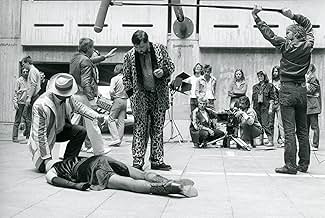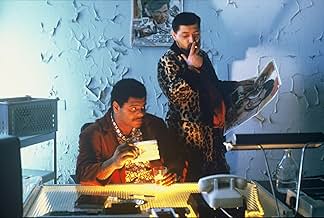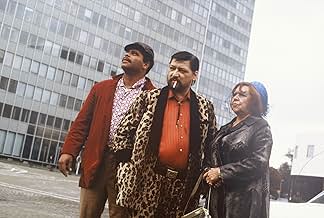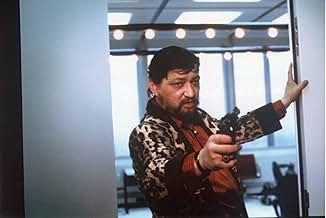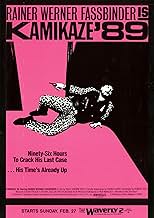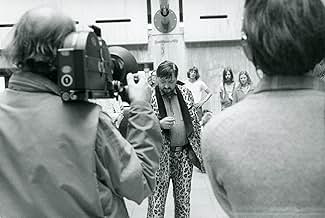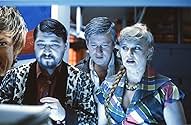Agrega una trama en tu idiomaIn a totalitarian society of the future, in which the government controls all facets of the press, a homicide detective investigates a string of bombings, and finds out more than he bargaine... Leer todoIn a totalitarian society of the future, in which the government controls all facets of the press, a homicide detective investigates a string of bombings, and finds out more than he bargained for.In a totalitarian society of the future, in which the government controls all facets of the press, a homicide detective investigates a string of bombings, and finds out more than he bargained for.
- Dirección
- Guionistas
- Elenco
- Premios
- 1 premio ganado y 3 nominaciones en total
Andreas Mannkopff
- Wechselschichtregisseur
- (as Andreas Mannkopf)
Ute Koska
- Polizeiärztin
- (as Ute Fitz-Koska)
Hans-Eckart Eckhardt
- Polizist
- (as Hans-Eckhardt Eckhardt)
- Dirección
- Guionistas
- Todo el elenco y el equipo
- Producción, taquilla y más en IMDbPro
Opiniones destacadas
I see in Kamikaze 1989 both echoes and premonitions of other much more famous films, all with considerably larger budgets. I recognize that this must be because all dystopic fiction commences from the two greats, Orwell's 1984 and Huxley's Brave New World. What subsequent creators have done is to put the pieces together in different orders, but the overarching totalitarian force governing the dystopic world, whether Blade Runner or The Hunger Games, Brazil, Robocop, or this obscure work not by but starring Rainer Werner Fassbinder, who in a bizarre reflection of a recurring trope of the film, himself became at the young age of 37, in the year 1982 (the year of this film's release), "ein unerwarteter Tod" = an unexpected death.
I am not sure whether this film would have been much better had it had the budget of Blade Runner or The Hunger Games, but I suspect that it would have been. On the other hand, we have grown accustomed to and now expect extremely fast-moving, often frenetic action in dystopic films. The pace here is incredibly slow, as though everyone is on some sort of downers (aside from the contestants in the Laughing Game, who are hooked up to IVs filled with hebephrenia-inducing drugs). Again: Huxley and Orwell already wrote it and others inspired by their works decided to dramatize the essence of dystopia.
Worth watching once, if only to see how later films may have been influenced by this creation.
I am not sure whether this film would have been much better had it had the budget of Blade Runner or The Hunger Games, but I suspect that it would have been. On the other hand, we have grown accustomed to and now expect extremely fast-moving, often frenetic action in dystopic films. The pace here is incredibly slow, as though everyone is on some sort of downers (aside from the contestants in the Laughing Game, who are hooked up to IVs filled with hebephrenia-inducing drugs). Again: Huxley and Orwell already wrote it and others inspired by their works decided to dramatize the essence of dystopia.
Worth watching once, if only to see how later films may have been influenced by this creation.
A movie worth seeing for none other that three main reasons:
The absurdist exercise in retrofuturism.
The drunkenly charming performance of Fassbinder.
The colorful anarchism of a production design that rewrites all the rules of what was then known as cyberpunk.
The movie with his unbridled and convoluted plot owes way more to William Burroughs than William Gibson. The satire, in this unique cinematographic experience is more a direction chosen by director Wolf Gremm, than a clearly defined series of remarks that one can extract or decipher in the script. It is certainly witty and doesn't take itself seriously but you will hardly find any classically intended humour in the short and surreal lines of the actors.
However this is the true strength of the movie and what allows it, to stand the test of time.
What kind of movie is 'Kamikaze 89'? Science fiction? Dystopia? It is definitely a special film from many points of view. The film is directed by Wolf Gremm (who is also a co-screenwriter), one of the well-known directors of the 'new German cinema' of the 1970s, author of films about inter-war Germany and of thrillers, all of them politically charged. The most important cinematographic personality that appears on the movie poster is however in this case not the director, but the actor who plays the main role. Rainer Werner Fassbinder was one of the leading figures in German cinema of that period. 'Kamikaze 89' was his last appearance on the screen, he died in June 1982, shortly after filming was completed.
The story takes place in 1989, 1989 as anticipated in 1982, in a future and totalitarian Germany. Fassbinder plays in this film the role of police lieutenant Janssen, called to investigate a suspected bombing, followed by a crime in the corporate headquarters that controls the morale of the population through television entertainment. His mission to solve the crime in the next four days is hampered by the fact that in the utopian society described in the film, officially, there are neither crimes nor suicides. The world of 'Kamikaze 89' is a rosy dystopia, in which the population is kept under control by Big Brother surveillance while the brains are washed and occupied by television shows such as the 'World Laughter Record'. The cynical, alcoholic and disillusioned Janssen may be the right man to solve this case, but as the circle of suspects gets closer to the company's bosses and that mysterious, secret '31st floor' in which the scenarios of future are written, the solving of the crime becomes a danger for the stability of the system.
The comparison between the future imagined in the literature and the films of anticipation and the reality of the anticipated period is, as always, fascinating. Although the interval is only seven years, the essential changes are those that take place in the social structure. Director Wolf Gremm did not have a budget that would allow him to create spectacular special effects, so he relied more on cultural extrapolations, some subtle, some less subtle. The Internet does not exist yet, and computers are as large as refrigerators and do not have graphical interfaces. Telephony and mobile videophones are controlled by the authorities. The population is fascinated by popular entertainment, and on this topic Gremm was able to correctly anticipate the devastating effect of 'reality show' genre, even if the phenomenon he described will occur one or two decades later than 1989. Electronic music and psychedelic clothing have become an aesthetic norm, and if we look at some societies in Asia today, we see that cultural conformism is not necessarily gray and militarized there. Leopard coats or jackets are police uniforms. The control of populations is facilitated by their addiction to escapist entertainment. The framing of the film in the patterns of the genre of punk anticipation is formally correct, but the stylistic decisions are motivated by a clear and not at all optimistic vision about the future.
Fassbinder's acting reminded me Orson Welles in the second part of his career. The director who gave the world in his youth the masterpiece 'Citizen Kane' constantly projected for grand plans, but after a few financial failures Hollywood no longer believed in him as a director. The result was that he appeared more as an actor, some of his roles were memorable as he succeeded to be both expressive and 'to melt' in his characters, modeling them according to his personality.
'Kamikaze 89' anticipates from many points of view the world 30 years later, with the domination of the big global corporations and the popular entertainment and communications as means of leveling the thinking of the population. 1989 however brought something else, the fall of the Iron Curtain followed by the reunification of Germany, historical events that Fassbinder prepared and anticipated artistically and ideologically in other films. Those were the milestones in the evolution towards the world of 'Kamikaze 89'.
The story takes place in 1989, 1989 as anticipated in 1982, in a future and totalitarian Germany. Fassbinder plays in this film the role of police lieutenant Janssen, called to investigate a suspected bombing, followed by a crime in the corporate headquarters that controls the morale of the population through television entertainment. His mission to solve the crime in the next four days is hampered by the fact that in the utopian society described in the film, officially, there are neither crimes nor suicides. The world of 'Kamikaze 89' is a rosy dystopia, in which the population is kept under control by Big Brother surveillance while the brains are washed and occupied by television shows such as the 'World Laughter Record'. The cynical, alcoholic and disillusioned Janssen may be the right man to solve this case, but as the circle of suspects gets closer to the company's bosses and that mysterious, secret '31st floor' in which the scenarios of future are written, the solving of the crime becomes a danger for the stability of the system.
The comparison between the future imagined in the literature and the films of anticipation and the reality of the anticipated period is, as always, fascinating. Although the interval is only seven years, the essential changes are those that take place in the social structure. Director Wolf Gremm did not have a budget that would allow him to create spectacular special effects, so he relied more on cultural extrapolations, some subtle, some less subtle. The Internet does not exist yet, and computers are as large as refrigerators and do not have graphical interfaces. Telephony and mobile videophones are controlled by the authorities. The population is fascinated by popular entertainment, and on this topic Gremm was able to correctly anticipate the devastating effect of 'reality show' genre, even if the phenomenon he described will occur one or two decades later than 1989. Electronic music and psychedelic clothing have become an aesthetic norm, and if we look at some societies in Asia today, we see that cultural conformism is not necessarily gray and militarized there. Leopard coats or jackets are police uniforms. The control of populations is facilitated by their addiction to escapist entertainment. The framing of the film in the patterns of the genre of punk anticipation is formally correct, but the stylistic decisions are motivated by a clear and not at all optimistic vision about the future.
Fassbinder's acting reminded me Orson Welles in the second part of his career. The director who gave the world in his youth the masterpiece 'Citizen Kane' constantly projected for grand plans, but after a few financial failures Hollywood no longer believed in him as a director. The result was that he appeared more as an actor, some of his roles were memorable as he succeeded to be both expressive and 'to melt' in his characters, modeling them according to his personality.
'Kamikaze 89' anticipates from many points of view the world 30 years later, with the domination of the big global corporations and the popular entertainment and communications as means of leveling the thinking of the population. 1989 however brought something else, the fall of the Iron Curtain followed by the reunification of Germany, historical events that Fassbinder prepared and anticipated artistically and ideologically in other films. Those were the milestones in the evolution towards the world of 'Kamikaze 89'.
10hasosch
Wolf Gremm's "Kamikaze 1989" portrays a Germany that is rich, in which all problems are solved, where there is no pollution of the environment, where people work in sterile dust-free rooms with artificial light and air-conditioning, where alcohol is forbidden, since it causes incalculable reactions, where private persons are not allowed to grow vegetables on their own, since seeds may be contaminated, where there are, finally, no suicides anymore, but just cases of "unexpected death". The whole industry is in the hand of one gigantic concern, and all of its leading crew are family members. Competition is excluded, since creativity is dangerous. Even the handful of intellectuals who are working in the "cultural" department of the concern, have just to confirm the "intellectual" doctrine of the concern. Thus, the totalitarian company represents the good, because what is good is always associated with might (cf. the definition of the "axis of evil"). And since everything seems to be under control, the position of the evil is empty. However, strictly speaking, good cannot exist without evil and vice versa, because these ethic terms define one another logically. However, the position of evil is empty only until the company gets a bomb threat. It seems that the "spirit of evil", Krysmopompas, whose members once belonged to the "prokos", the intellectuals that used to work in the hidden 31st floor of the building, are behind the threat.
Police lieutenant Jansen, unforgettably played by Rainer Werner Fassbinder in his last role, is charged with the investigation, during which the open position of Krysmopompas is offered to him several times, but he refuses to take it over. Since the concern represents the good, the police must represent the evil. Even the police president is in the hand of the concern and looks like a caricature of Dr. Mabuse turned himself into a puppet. Possibly Jansen realizes that becoming Krysmopompas and thus fulfilling the vacuum of evilness would just consolidate the omnipotent concern, because it needs the evil to define itself as the good. Consequently, the director of the concern offers him a job, which Jansen also refuses. Therefore, Jansen takes a third position in a world in which there are only two, and this is presumably the reason why the movie is called "Kamikaze". However the title may be meant, this movie offers a highly complicated situation in which the categories of ethics are perverted. The typical 80ies' German TV-style of this movie should not make the audience blind that in portraying paradoxical ethical categories in a world in which metaphysics has been shoveled out like the alcohol, the seeds and suicide, "Kamikaze" goes way beyond thematically related movies like Godard's "Alphaville", Kubrik's "Dr. Strangelove" and even Tarkovsky's "Solyaris". A few years before "Kamikaze 1989", Fassbinder himself had directed the science-fiction movie "Welt am Draht" ("World on wire") which many people believe to have surpassed "Solyaris". In the final scene of Kamikaze, Fassbinder says his ultimate goodbye to his audience grinning in front of a picture of Armstrong's moon landing.
Police lieutenant Jansen, unforgettably played by Rainer Werner Fassbinder in his last role, is charged with the investigation, during which the open position of Krysmopompas is offered to him several times, but he refuses to take it over. Since the concern represents the good, the police must represent the evil. Even the police president is in the hand of the concern and looks like a caricature of Dr. Mabuse turned himself into a puppet. Possibly Jansen realizes that becoming Krysmopompas and thus fulfilling the vacuum of evilness would just consolidate the omnipotent concern, because it needs the evil to define itself as the good. Consequently, the director of the concern offers him a job, which Jansen also refuses. Therefore, Jansen takes a third position in a world in which there are only two, and this is presumably the reason why the movie is called "Kamikaze". However the title may be meant, this movie offers a highly complicated situation in which the categories of ethics are perverted. The typical 80ies' German TV-style of this movie should not make the audience blind that in portraying paradoxical ethical categories in a world in which metaphysics has been shoveled out like the alcohol, the seeds and suicide, "Kamikaze" goes way beyond thematically related movies like Godard's "Alphaville", Kubrik's "Dr. Strangelove" and even Tarkovsky's "Solyaris". A few years before "Kamikaze 1989", Fassbinder himself had directed the science-fiction movie "Welt am Draht" ("World on wire") which many people believe to have surpassed "Solyaris". In the final scene of Kamikaze, Fassbinder says his ultimate goodbye to his audience grinning in front of a picture of Armstrong's moon landing.
1989, to be precise. As imagined by Germans in 1982. Germany has become the world's foremost economic superpower, suicide is a thing of the past, and everyone does drugs, except there are no nasty side effects anymore. An overweight Rainer Werner Fassbinder mostly scowls his way through a quest to find out who's behind a series of murders that may be linked to a new resistance group. Or something like that. The plot seems secondary to the outrageous costumes (Fassbinder wears leopard tights throughout the whole film) and scenarios (like a police discotheque where you can shoot on firing ranges). It's an ugly film, and a stupid one, too, but it is perversely fascinating, and worth watching once, if only to impress your friends.
¿Sabías que…?
- TriviaThis was the final acting role for Rainer Werner Fassbinder.
- ErroresThe movie claims 27 September 1989 to be a Monday, but that day was a Wednesday (The movie plays in 1989, as the title and a spoken intro make clear. The supposed explosion in the beginning of the movie was planned to take place on September 23, as Jansen points out. The chief of the police then urges Jansen to solve the case within for days, saying "until Monday afternoon," which would be September 27).
- Citas
Policewoman: Suicide
Polizeileutnant Jansen: It would be the first in four years.
Policewoman: Sorry, I meant 'premature death.
- ConexionesFeatured in Fassbinder (2015)
Selecciones populares
Inicia sesión para calificar y agrega a la lista de videos para obtener recomendaciones personalizadas
- How long is Kamikaze 89?Con tecnología de Alexa
Detalles
Taquilla
- Total en EE. UU. y Canadá
- USD 22,440
- Fin de semana de estreno en EE. UU. y Canadá
- USD 5,613
- 5 jun 2016
- Total a nivel mundial
- USD 22,440
Contribuir a esta página
Sugiere una edición o agrega el contenido que falta

Principales brechas de datos
By what name was Kamikaze 1989 (1982) officially released in India in English?
Responda

